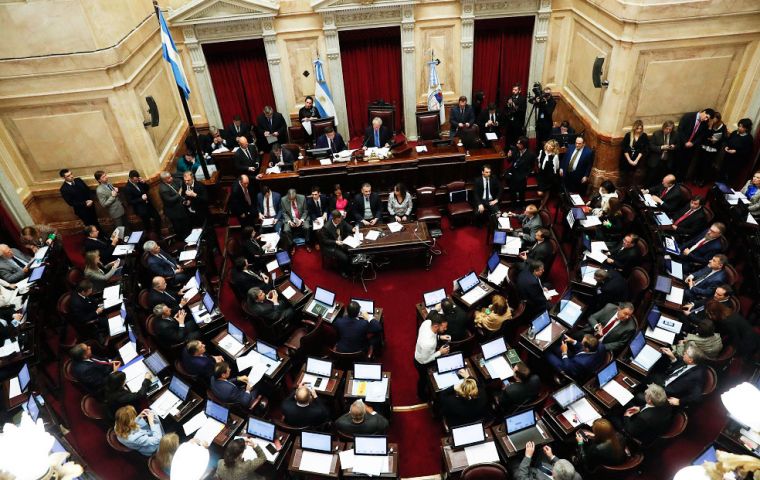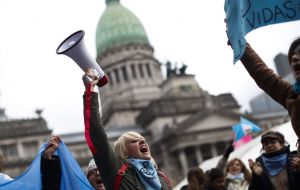MercoPress. South Atlantic News Agency
Argentina: abortion bill rejected but reforms could be introduced to the Criminal Code
 Thirty-eight senators voted against the legislation on Thursday dawn following a debate that lasted more than 15 hours.
Thirty-eight senators voted against the legislation on Thursday dawn following a debate that lasted more than 15 hours.  Thousands under pouring rain followed the debate in the square next to Congress, divided in the “green camp”, and in the “blue camp” contrary to the bill
Thousands under pouring rain followed the debate in the square next to Congress, divided in the “green camp”, and in the “blue camp” contrary to the bill  Magistrate Mariano Borinsky heads a special commission drafting reforms to the Criminal Code, that could include lenient amendments to the abortion issue
Magistrate Mariano Borinsky heads a special commission drafting reforms to the Criminal Code, that could include lenient amendments to the abortion issue The Argentine Senate as was anticipated finally rejected a divisive bill that would have legalized elective abortion for pregnancies of up to 14 weeks. Thirty-eight senators voted against the legislation on Thursday following a debate that lasted more than 15 hours.
There were 31 votes in favor - falling short of the 35-vote majority needed for bills to pass - and two abstentions. The bill had originally been passed by Congress' lower house by a narrow margin in June.
The proposed bill provoked fierce debate in Argentina where the Catholic Church has great influence and demonstrations for and against the legislation have taken place frequently in recent weeks, including during the final debate.
Thousands under pouring rain followed the debate in the square next to Congress, divided in the “green camp” with green scarves and headbands, in support of the bill, and opposite, the “blue camp” the national flag's color, who rejected the controversial initiative. A wide cleared area between barriers separated the concentrations.
Despite strong feelings on both sides, the response to the results has been largely peaceful.
Although under Argentine congress procedure the initiative can't be presented until the next legislature, March first, a short cut apparently is in the way. A special commission has been working in reforming the Argentine Criminal Code, and sometime late August, early September is expected to deliver the bill to president Mauricio Macri. Codes are bills that need to be approved by Congress.
In effect, magistrate Mariano Borinsky, who heads the special commission advanced that the amended criminal code will not legalize or decriminalize abortion, but following a recent benchmark ruling from the Supreme Court, will make the procedure, conditions, and availability of the intervention more flexible. For example it introduces the term “mental health” and gives the courts more leeway to consider facts surrounding the decision, and also softens considerably possible sentences.




Top Comments
Disclaimer & comment rules-

-

-

Read all commentsThe Aug. 8 rejection by the Senate of a bill legalizing abortions outlines a need to further separate the Argentine state from the Catholic Church, an institution that used its resources and influence to sway an undetermined number of senators and thereby imposing religious principles on society at large.
Aug 09th, 2018 - 04:21 pm +2Although Argentina is a laic country, the state still pays the wages of bishops and archbishops to the tune of $130 million pesos per year. Much more is given to the Catholic Church in subsidies to private Catholic schools, tax exemptions, church buildings maintenance etc.
In contrast, Brazil, Uruguay and Chile do not support any cult.
It may come as a surprise to many that Argentina legalized divorce only in 1987 under the government of Raul Alfonsin. The Catholic Church led a fierce battle to prevent the passing of the bill that included threats of excomunion to legislators voting in favour.
Uruguay, in contrast, legalized divorce in 1907.
Argentina had previously approved divorce in 1954 under the government of Juan Domingo Peron, however the military dictatorship issued of the bloody 1955 coup promptly cancelled that law.
In 2010, under the government of Cristina Fernandez de Kirchner, legislators passed the “equality marriage” law that allowed same sex couples to legalize their unions. Again, the Catholic Church led the opposition to the law, predicting total decomposition of society.
It remains that, in spite of this setback, women across the country have developed a powerful, irreversible movement that will eventually move the Argentine society ahead.
The green handkerchiefs have become a part of our history.
Reekie,
Aug 09th, 2018 - 05:06 pm 0“a need to further separate the Argentine state from the Catholic Church”
I agree.
@EM
Aug 09th, 2018 - 05:22 pm 0Well, it seems like we all could agree to that
Commenting for this story is now closed.
If you have a Facebook account, become a fan and comment on our Facebook Page!